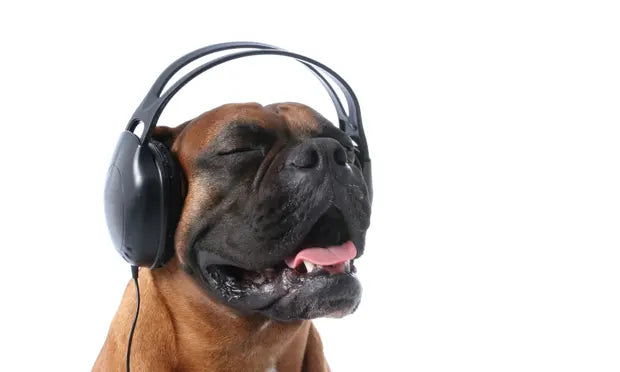Music has an incredible ability to touch our souls, and it turns out that dogs are no exception. Whether it's the melodic tones, rhythmic patterns, or soothing harmonies, music has a profound impact on our furry four-legged friends. In this blog, we'll explore the calming effects of music on dogs, and we'll examine how music can lower cortisol levels, reducing stress and anxiety in dogs.
The Power of Tempo (BPM): Tempo plays a big role in setting the mood and eliciting emotions in music, think Barry White! Dogs, with their heightened senses, are particularly responsive to different tempos. Studies have shown that a tempo of 50-60 BPM is especially effective in calming dogs. This range closely resembles a resting heart rate, which may explain why it has a soothing effect on our canine companions. Soothing and slow-paced music with this tempo can help create a tranquil environment for your furry friend. Think slow jams, Reggae and Classical Music (minus the percussion).
How do we know? Studies on Calming Effects of Music: Lindig AM, Tammie Kind, Lynne Graham, and Boman are notable researchers who have delved into the impact of music on dogs. Their studies have shown promising results, indicating that music has the power to reduce stress and anxiety in dogs, leading to a calmer state of mind.
Why is this good? We can lower Cortisol (the fight or flight stress hormone): Cortisol is a hormone released in response to stress. High cortisol levels can contribute to anxiety and restlessness in dogs. One fascinating aspect of music's impact on dogs is its ability to lower cortisol levels. Studies have shown that listening to calming music can reduce cortisol production, promoting a more relaxed and stress-free environment for our furry friends.
Help to slow down your dogs panicked breathing: When dogs are stressed out they pant. A panic attack in a dog can look like fast, quick breathing just like humans and the inability for humans to "Catch their breath". When dogs are calm, they have slower, calmer breathing. In many of the studies on relaxing music for dogs, dogs experienced lower respiratory rates indicating a reduction in stress levels.
Help your dogs heart rate variability. Everyones heart beat increases its rate in stressful situations. The adrenal glands make and release the hormone cortisol into your bloodstream. The stress hormonecauses an increase in your heart rate and blood pressure. It's your bodys “flight or fight” response that has kept humans and animals alive for thousands of years. High heart rate variability is a measure of the variation in time between each heartbeat. The shorter the time between each heartbeat, the more stressed you or your dog is. Dogs with anxiety have low HRVs. However, in many of the studies we discussed, the calming music for dogs resulted in a high HRV, indicating a stress reduction in dogs.
Reduce all these symptoms in yourself (the human) too. When you see all these symptoms in your own stressed dog, you become stressed too, as you just want to do right by your dog. Being the best pet parent and reducing these symptoms in your dog will relieve your stress and anxiety as well. Dogs are pack animals and will feed off your stress, as well as your stress relief.
PAWNIX had included a classical play list that you can use via SPOTIFY to play for your pup in their PAWNIX noise cancelling headphones for dogs.
https://pawnix.com/pages/4urdogslisteningpleasure
Conclusion: The power of music to calm and soothe dogs is undeniable. With the ideal tempo of 50-60 BPM, music can create a tranquil atmosphere and promote a state of relaxation. The studies conducted by Lindig AM, Tammie Kind, Lynne Graham, and Boman have shed light on the positive effects of music on dogs, including reduced stress, anxiety, and lower cortisol levels. So, the next time you want to create a peaceful environment for your canine companion, consider playing some gentle music with a tempo that matches their resting heart rate. Your furry friend will surely appreciate the soothing melodies and find solace in the music's embrace.
REFERENCES
Tammie Kind's research focused on the effects of reggae music on dogs' stress levels. The study found that reggae, with its laid-back rhythms and soothing melodies, had a positive impact on dogs' behavior. The dogs appeared more relaxed, with reduced signs of anxiety and increased levels of contentment.
-
King, Tammie, et al. "Effect of Music on Stress Parameters in Dogs during a Mock Veterinary Visit." Animals : an Open Access Journal from MDPI, MDPI, 13 Jan. 2022, https://www.ncbi.nlm.nih.gov/pmc/articles/PMC8772971/.
Lindig AM's study revealed that classical music, played at a slow tempo, significantly reduced stress-related behaviors in shelter dogs. The dogs exhibited lower heart rates and calmer demeanors when exposed to music with a tempo in the 50-60 BPM range.
-
Lindig, Abigail M, et al. "Musical Dogs: A Review of the Influence of Auditory Enrichment on Canine Health and Behavior." Animals : an Open Access Journal from MDPI, MDPI, 13 Jan. 2020, https://www.ncbi.nlm.nih.gov/pmc/articles/PMC7022433/.
Lynne Graham's study explored the use of music in veterinary clinics. Classical music played at 50-60 BPM was found to have a calming effect on dogs waiting in the clinic, minimizing their stress and promoting a sense of ease.
- Wells, D. L., Lynne Graham, and Peter G. Hepper. "The influence of auditory stimulation on the behaviour of dogs housed in a rescue shelter." Animal Welfare 11.4 (2002): 385-393.
Boman's research investigated the physiological response of dogs to various genres of music. The study demonstrated that slow-tempo classical music resulted in reduced cortisol levels, indicating a decrease in stress. Lower cortisol levels are associated with a relaxed state, suggesting that music can help dogs achieve a peaceful state of mind.
-
Bowman, A., et al. "'The Effect of Different Genres of Music on the Stress Levels of Kennelled Dogs'." Physiology & Behavior, Elsevier, 14 Jan. 2017, https://www.sciencedirect.com/science/article/abs/pii/S0031938416306977.
- Thoma, Myriam V, et al. "The Effect of Music on the Human Stress Response." PloS One, Public Library of Science, 5 Aug. 2013, https://www.ncbi.nlm.nih.gov/pmc/articles/PMC3734071/.
-
McDonald, C I, and S Zaki. "A Role for Classical Music in Veterinary Practice: Does Exposure to Classical Music Reduce Stress in Hospitalised Dogs?" Australian Veterinary Journal, U.S. National Library of Medicine, https://pubmed.ncbi.nlm.nih.gov/31943134/.





Leave a comment (all fields required)